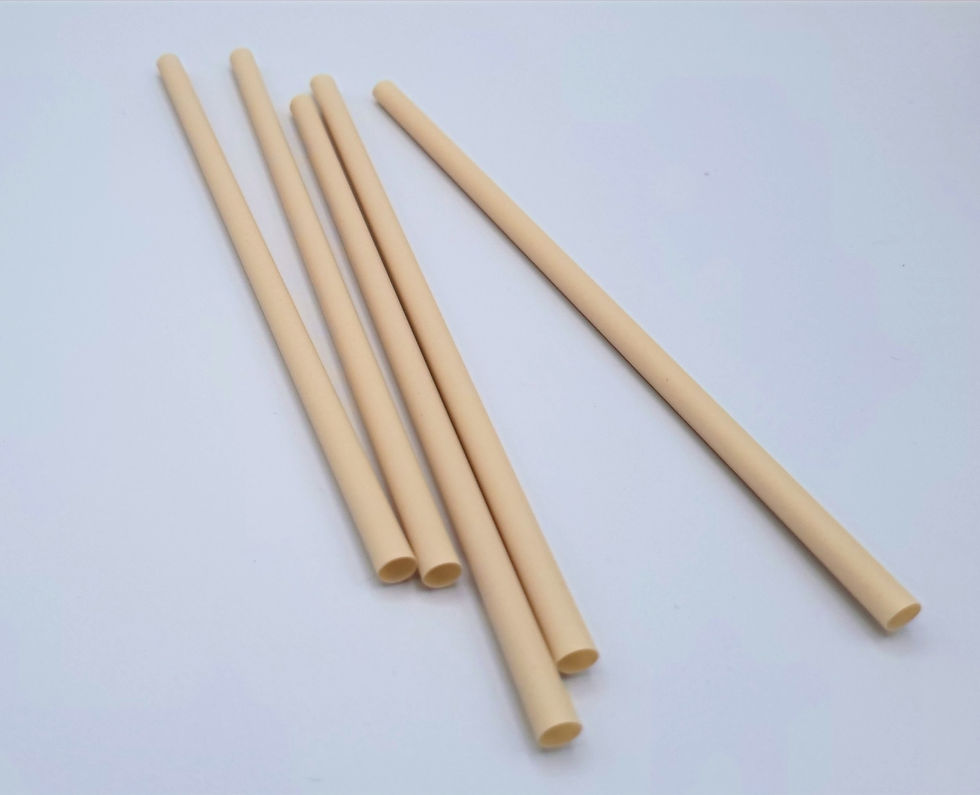Sustainable STEM: Ecovibe Bamboo Straws
- Ben

- Feb 13, 2022
- 4 min read
Updated: Aug 18, 2022

As an Amazon Associate I earn from qualifying purchases
Welcome to another Ben + STEM’s review of alternative-to-plastic materials and supplies for your STEM or STEAM class. This review is on Ecovibe Bamboo Straws, but you can check out some of our other reviews like corn-based flatware, Birchwood flatware, and rice straws. Interested in trying these eco-friendly products out? Check out a Ben + STEM Sustainable STEM Sample box.
Straws are often a staple in STEM learning! In addition to my own STEM classroom, I have visited many makerspaces, fablabs, hackerspaces and school STEM days; I reliably see at least one box of single-use plastic straws for students to use in some form or fashion. Straws are cheap and easily accessible material for educators in a wide range of STEM and STEAM activities.
The irony of students ideating solutions local, national, and global problems while using environmentally detrimental materials is not lost on me. I think we as STEM educators can be more purposeful in making as many environmentally friendly choices as we can (and be an advocate for change at the school and the paradigms of our students on their forthcoming consumer behavior. I am particularly excited to see what STEM products can be created with bamboo.

Bamboo is an amazing plant! Used as both a food source and material for an incredibly wide range of human and animal products, new and innovative uses are being generated every year at a rapid pace. A great aspect of bamboo is that it can be harvested and continue growing without the need to be replanted, produces more oxygen than trees, fixes carbon in the soil, reduces soil erosion, and grows rapidly. Consumers are changing their spending behavior to include more bamboo products. I love supporting materials with a green footprint that are part of a solution in combating climate change.
I explored several companies in the process of manufacturing bamboo straws and most companies harvest the material from countries like China, India, Vietnam, and Bali. Today’s review is on Ecovibe straws manufactured in China. According to the company, their bamboo fiber straws are biodegradable, 100% natural, and plastic-free. I was unable to find a website to purchase them outside of Amazon, so the details on this product from the company are a bit sparse.

Decomposition Timeline and Process: I will contact the company and ask about disposal recommendations. The box says “36 months” shelf life, but I do not know if these will compost or how long it would take to actually biodegrade. There are two pictures on their Amazon page that show some straws in the decomposition process, so I would like to try to recreate this myself. However, it is February in the Midwest so not a lot of biodegradation is happening outside right now!

Ben was born in the Midwest and so he is used to this. His human family is not.
Physical Characteristics: Wow. These look and feel just like plastic straws. They are very light and have a smooth matte-like feel. The color is an off-white and the diameter is very consistent from straw to straw within the box.

Tensile Strength: Bamboo is incredibly strong, yet flexible, and that describes these straws pretty well. If you bend them, they end up with a crease, but there was no immediate breakage in the integrity of the wall of the straw. I twisted the living daylights out of a straw to see if I could get it to break and I did manage to make one tiny sliver of a hole. I would say the tensile strength is pretty high and these straws can take quite a beating for STEM projects.
Longevity in Liquid: I soaked the bamboo straw in different temperatures of water for extended periods of time.
Cold Water (65F): Maintained rigidity for hours and the straw never changed in any distinguishable way.
Hot Water (183F): Maintained rigidity while the water was hot and the straw did not change in any distinguishable way.
I let them dry on a towel and they maintained their shape perfectly and could be used again.

Floating bamboo straws with biodegradable Kraft tape
Conclusion: I was very surprised at how similar these bamboo straws look and feel to plastic straws. I tried to do some investigation into the Ecovibe company and didn’t find much, so I am going to hold off for now on fully supporting this particular company’s bamboo straws at this time. My hope is that they are indeed an ecofriendly alternative to single-use plastic straws because bamboo is such an incredible partner in STEM education. I am definitely going to review more bamboo straws to compare.
As always, avoiding single-use items and sticking to more permanent solutions is ideal (i.e., metal or glass straws), however if you choose to move toward bamboo-based straws for your STEM or STEAM activities:
Please follow the manufacturer’s instructions to dispose of the materials. If you are unable to find manufacturer information, find a brand out there that will be more transparent with this information.
The Ecovibe straws are flexible and tough. I believe they can do as well of a job in a STEM activity as plastic straws of the same size and diameter.
The Ecovibe bamboo fiber straws stay rigid in both hot and cold water for extended periods of time.
Avoid bamboo straw brands that use plastic to individually wrap the straws or package materials. Ecovibe did not use plastic in their packaging.
Keep an eye out for more at Ben + STEM as we continue to explore eco-friendly materials and supplies for your STEM or STEAM classroom! Interested in trying these eco-friendly products out? Check out a Ben + STEM Sustainable STEM Sample box.




Comments